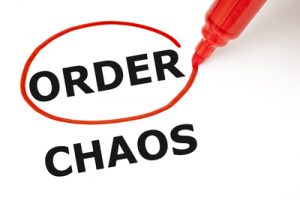“Order of Business” says when you can make a motion
It is a fundamental principle of Robert’s Rules of Order Newly Revised, 12th edition (RONR) that main motions must be taken up at the proper time on the agenda. (A main motion proposes action by the body). This is necessary in order to preserve order, and the rights of members. To that end, RONR establishes a standard “Order of Business.” This describes the classes of business and when each will be considered. If you have adopted RONR, this is your Order of Business.
Standard Order of Business
- Reading and Approval of Minutes
- Reports of Officers, Boards, and Standing Committees
- Reports of Special (Select or Ad Hoc) Committees
- Special Orders
- Unfinished Business* and General Orders
- New Business
*The expression “old business” should be avoided, since it may incorrectly suggest the further consideration of matters that have been finally disposed of.
Agenda depends on Order of Business
Once the Order of Business is established, the leadership prepares an agenda for each specific meeting. Read more about agenda here. In preparing the agenda for a meeting, the leadership will group items under their proper class as indicated above.
Boards and councils are free to establish their own Order of Business. This should ordinarily be done by passing a Special Rule of Order and is quite easy to do. Read our article here. If your body has not done so, but follows a different order by long custom, that is also acceptable. It would be prudent, however, to formalize the custom by adopting a Special Rule of Order.
Recommended agenda labels
We recommend that a local government body mark items as Information, Discussion, or Decision. We do not recommend using the label “action” because for such a body, discussion is also an action. If your body has a custom of processing motions with two or three readings, those will be incorporated as well.
New business can be problematic
Under RONR, “new business” is a class under which members may propose items that have not yet been considered by the body. In general, members of nonprofits have large freedom to do this.
However, we have found that local government bodies generally do not use the category “new business” as an item under which their members can make new main motions. The reasons are:
- Most boards and councils have a process for putting items on the agenda.
- It takes time and thought to prepare main motions adequately for consideration by the body.
- The public should know when significant matters are to be considered.
No new motions during Council Comments
If your agenda includes an item entitled “Council Comments” or “Council Reports,” speeches during these items are limited to information only. Members may not make new motions during these items. However, they are free to suggest that an item be considered at a future meeting, or an action taken. The leadership will, of course, take the suggestion into account in accord with your process.
Violating the Order of Business
I attended a council meeting at which a local nonprofit was honored by a proclamation celebrating their work. In her speech of thanks, the executive director requested that the city award some money to the nonprofit. Immediately after, before the mayor could call for public comment, a councilmember moved to award the money. This was not the right time to do this, so the council postponed the motion for later consideration.
What should chair do?
If your council has adopted Robert’s Rules of Order, or your own Order of Business, and a member makes a main motion at the wrong time, the chair should rule the motion out of order. The chair may gently suggest when the item could be taken up.
Read more about Order of Business in Robert’s Rules of Order
You can read more about this topic, including “general orders” and “special orders,” in RONR, Section 41.
Do you have members who pop up with motions whenever they feel like it? Let us know!



Thank you. There are times when the President of our board will discuss something & then ask for a motion. This is especially annoying when it’s not on the agenda.